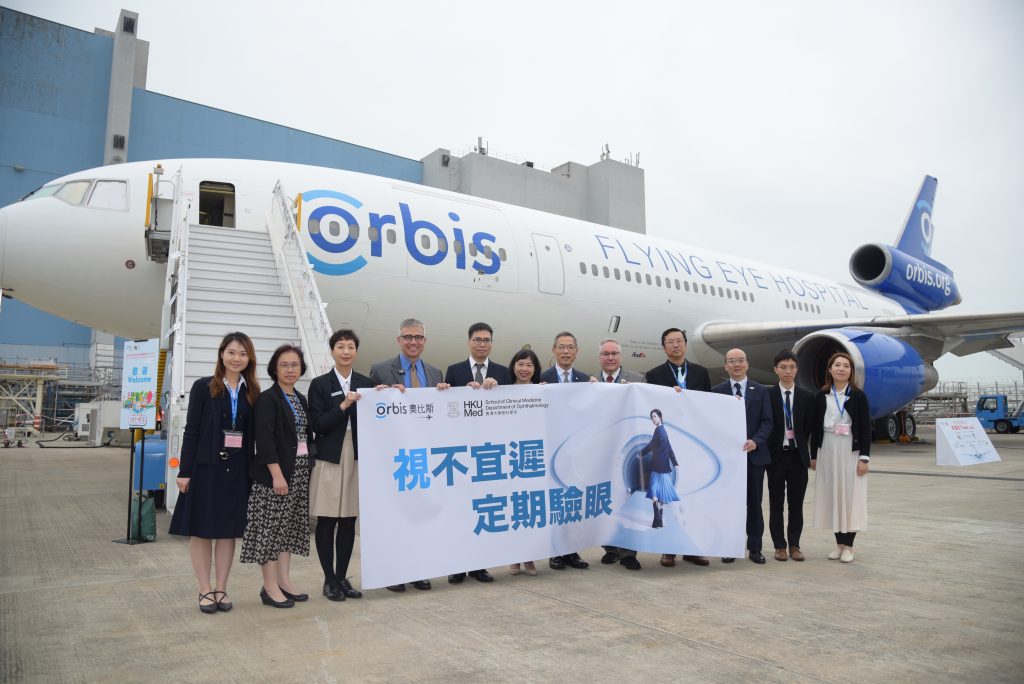May 2024 | Volume 25 No. 2
Vision for the Future
Listen to this article:
The screening programme – called Vision Matters: Glaucoma AI-ROTA Screening Project for 50+ – was launched in May last year through a collaboration between HKU’s Department of Ophthalmology and Orbis, and was made possible through technology called ROTA (Retinal nerve fibre layer Optical Texture Analysis), which was developed over nearly four years by HKUMed working in collaboration with the Chinese University of Hong Kong.
“Glaucoma is the leading cause of irreversible blindness, but previously screening for glaucoma has not been effective because of the lack of clinical tools that are sensitive and specific enough to detect the disease, especially in the early stages,” said Professor Christopher Leung Kai-shun, Chairperson and Clinical Professor of the Department of Ophthalmology, who directed the research team. “ROTA represents a highly sensitive and specific technology that makes glaucoma screening possible.”
ROTA is a patented algorithm that enables direct visualisation of the nerve fibres on the retina in high resolution using standard optical coherence tomography (OCT) scans. It integrates the measurements obtained from the standard OCT scans commonly used to detect signs of glaucoma – namely the thickness and reflectance of the retinal nerve fibre layer (RNFL) – to discern the optical texture and trajectories of the axonal fibre bundles and reveal RNFL defects. ROTA can detect focal RNFL defects that are missed by standard clinical tests, significantly improving the accuracy of early detection of optic nerve damage within and beyond the macula caused by glaucoma.
The research results for ROTA have been featured in two leading academic journals – Nature Biomedical Engineering and Ophthalmology.
“It is ROTA technology that has enabled us to launch Vision Matters,” said Professor Leung. “Through offering free and comprehensive eye screening services to randomly selected Hong Kong residents aged 50 or above who live in public rental housing, Vision Matters will identify patients with glaucoma in Hong Kong who may not be aware of the disease.”
Vision Matters is a joint programme with Orbis, the international non-profit organisation that fights avoidable blindness across the globe. “We shared the Nature Biomedical Engineering article with Orbis in 2021 and discussed the opportunity to collaborate,” said Professor Leung. “HKUMed conceived the project and came up with research ideas (Vision Matters is also an epidemiology study and a clinical trial), as well as provided the manpower for eye examinations and investigations. Orbis coordinated the programme, and looked after logistics, patient scheduling and human resources activities.”
As well as screening for glaucoma, the project also aims to get an overall picture of the state of eyesight in Hong Kong’s over-50s. “We’d like to investigate the prevalence of glaucoma and other common eye diseases including cataract, diabetic retinopathy, age-related macular degeneration, and their risk factors in Hong Kong,” said Professor Leung.
More than 1,100 participants have been examined so far, and the aim is to complete 3,000-plus examinations by year end. Study sites have been set up at the HKU Eye Centre, Wah Kwai Community Centre, Kwun Tong District Health Centre Express and Tai Po District Health Centre Express.
“There will be a second phase when open invitations will go out to Hong Kong residents who express interest in undergoing an eye examination with ROTA,” said Professor Leung. “While there are no plans yet to extend Vision Matters to other districts, we do have a plan to set up primary eye care services in Hong Kong, building from the model of Vision Matters.”
Major breakthrough
The development of AI-ROTA marked a major breakthrough in ophthalmic care. It provides clinicians with quantitative and objective assessment of RNFL defects, which can help them detect early signs of glaucoma and monitor disease progression over time. It is also an effective tool for improving the accuracy and reliability of diagnosis and treatment monitoring of non-glaucomatous optic nerve diseases such as optic neuritis in multiple sclerosis, compressive optic neuropathies, and hereditary optic neuropathies. ROTA has attracted great interest in the ophthalmic industry.
“Two multinational manufacturers of OCT have obtained licenses to implement ROTA into their clinical OCT systems across the globe. A third licencing agreement is about to be completed with another OCT manufacturer from Japan,” said Professor Leung.
“In addition to its use for Vision Matters, HKUMed is working with the University of California San Diego, to apply ROTA in research and patient care. We are also investigating and applying the AI-ROTA technology for prediction of vision function and assessment of glaucoma progression.”
At the launch ceremony for Vision Matters, Professor Chak-sing Lau, Dean of Medicine, said: “For 136 years and counting, HKUMed has maintained a steadfast record of promoting and protecting health in Hong Kong and beyond. As we have seen in the recent pandemic, mutual support and concerted efforts of all stakeholders, including the government, healthcare professionals and members of the public, are crucial in keeping diseases in check. We are delighted to partner with Orbis in launching Vision Matters in order to reduce the dire impact of glaucoma.”

Professor Leung (fifth from left) shared the progress updates on the Orbis Flying Eye Hospital in February 2024.
Retinal nerve fibre layer Optical Texture Analysis (ROTA) represents a highly sensitive and specific technology that makes glaucoma screening possible.

Professor Christopher Leung Kai-shun

